2009年高考英语试题全国卷2[解析版]
- 格式:doc
- 大小:4.52 MB
- 文档页数:27
![2009年高考英语试题上海卷[解析版]](https://uimg.taocdn.com/beaf9d16102de2bd97058890.webp)
2009年普通高等学校招生全国统一考试(上海卷)英语考生注意:1.本试卷分为第Ⅰ卷(第1—12页)和第Ⅱ卷(第13页)两部分。
全卷共13页。
满分150分。
考试时间120分钟.2.答第Ⅰ卷前,考生务必在答题卡和答题纸上用钢笔或圆珠笔清楚填写姓名、准考证号、校验码,并用铅笔在答题卡上正确涂写准考证号和校验码。
3.第Ⅰ卷(1—16小题,25-84小题)由机器阅卷,答案必须全部涂写在答题卡上。
考生应将代表正确的小方格用铅笔涂黑。
注意试题题号和答题卡编号一一对应,不能错位。
答案需要更改时,必须将原选项用橡皮擦去,重新选择.答案不能涂写在试卷上,涂写在试卷上一律不给分。
第Ⅰ卷中的第17-24小题和第Ⅱ卷的试题,其答案用钢笔或圆珠笔写在答题纸上,如用铅笔答题,或写在试卷上也一律不给分.第Ⅰ卷(共105分)Ⅰ.Listening ComprehensionSection ADirection: In Section A, you will hear ten short conversations between two speakers。
At the end of each conversation,a question will be asked about what was said。
The conversations and the questions will be spoken only once。
After you hear a conversation and the questions about it,read the four possible answers on your paper, and decide which one is the best answer to the question you have heard.1。
A。
Go to the office B. Keep callingC。
![2009年高考英语试题上海卷[解析版]](https://uimg.taocdn.com/694b8cd2453610661fd9f463.webp)
2009年普通高等学校招生全国统一考试(上海卷)英语考生注意:1.本试卷分为第Ⅰ卷(第1—12页)和第Ⅱ卷(第13页)两部分。
全卷共13页。
满分150分。
考试时间120分钟。
2.答第Ⅰ卷前,考生务必在答题卡和答题纸上用钢笔或圆珠笔清楚填写姓名、准考证号、校验码,并用铅笔在答题卡上正确涂写准考证号和校验码.3.第Ⅰ卷(1—16小题,25—84小题)由机器阅卷,答案必须全部涂写在答题卡上。
考生应将代表正确的小方格用铅笔涂黑。
注意试题题号和答题卡编号一一对应,不能错位。
答案需要更改时,必须将原选项用橡皮擦去,重新选择.答案不能涂写在试卷上,涂写在试卷上一律不给分。
第Ⅰ卷中的第17-24小题和第Ⅱ卷的试题,其答案用钢笔或圆珠笔写在答题纸上,如用铅笔答题,或写在试卷上也一律不给分。
第Ⅰ卷(共105分)Ⅰ.Listening ComprehensionSection ADirection:In Section A,you will hear ten short conversations between two speakers. At the end of each conversation, a question will be asked about what was said。
The conversations and the questions will be spoken only once。
After you hear a conversation and the questions about it, read the four possible answers on your paper, and decide which one is the best answer to the question you have heard.1. A。
Go to the office B。
Keep callingC。
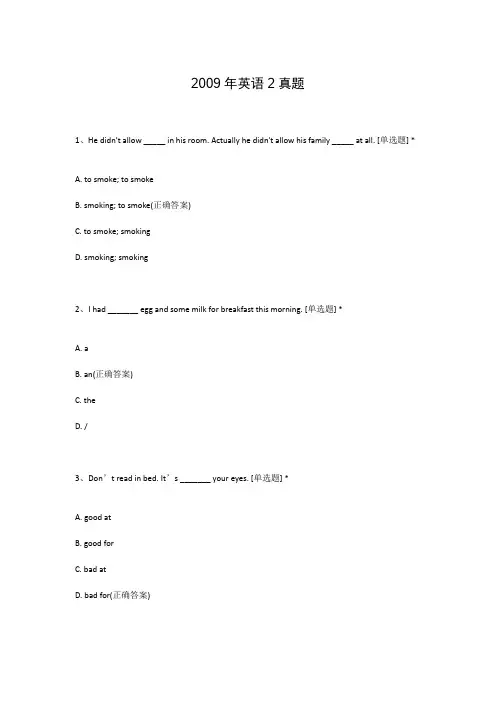
2009年英语2真题1、He didn't allow _____ in his room. Actually he didn't allow his family _____ at all. [单选题] *A. to smoke; to smokeB. smoking; to smoke(正确答案)C. to smoke; smokingD. smoking; smoking2、I had _______ egg and some milk for breakfast this morning. [单选题] *A. aB. an(正确答案)C. theD. /3、Don’t read in bed. It’s _______ your eyes. [单选题] *A. good atB. good forC. bad atD. bad for(正确答案)4、The children ______ visiting the museum. [单选题] *A. look overB. look forward to(正确答案)C. look forD. look after5、“I think you are wonderful,”she said, “You are so patient with your little George.”[单选题] *A. 耐心(正确答案)B. 细心C. 关心D. 偏心6、—When are you going to Hainan Island for a holiday? —______ the morning of 1st May.()[单选题] *A. InB. AtC. On(正确答案)D. For7、You should take the medicine after you read the _______. [单选题] *A. linesB. wordsC. instructions(正确答案)D. suggestions8、Actually, we don't know whether this news comes from a reliable()or not. [单选题] *A. source(正确答案)B. originC. basisD. base9、We have ______ homework today. ()[单选题] *A. too manyB. too much(正确答案)C. much tooD. very much10、Lucy _______ at 7:00 every day. [单选题] *A. go to schoolB. goes to school(正确答案)C. to go to schoolD. went?to?school11、_____, Martin can reach the branch of that tall tree at the gate. [单选题] *A. As a short manB. Being shortC. As he is shortD. Short as he is(正确答案)12、Many of my classmates are working _______volunteers. [单选题] *A. as(正确答案)B. toC. atD. like13、4.—Let's fly a kite when you are ________ at the weekend.—Good idea. [单选题] * A.warmB.kindC.smallD.free(正确答案)14、20.Sometimes it often rains ________ in my hometown in summer. [单选题] * A.heavyB.hardlyC.heavily(正确答案)D.strongly15、He always ______ the teacher carefully in class. [单选题] *A. listensB. listens to(正确答案)C. hearsD. hears of16、Now he is _______ his homework. [单选题] *A. busyB. busy with(正确答案)C. busy with doingD. busy does17、I have worked all day. I'm so tired that I need _____ . [单选题] *A. a night restB. rest of nightC. a night's rest(正确答案)D. a rest of night18、—What can I do for you? —I ______ a pair of new shoes.()[单选题] *A. likeB. would lookC. would like(正确答案)D. take19、He has two sisters but I have not _____. [单选题] *A. noneB. someC. onesD. any(正确答案)20、25.A watch is important in our life. It is used for ______ the time. [单选题] * A.telling (正确答案)B.sayingC.speakingD.holding21、Since the war their country has taken many important steps to improve its economic situation. [单选题] *A. 制定B. 提出C. 讨论D. 采取(正确答案)22、I've never been to Africa, but that is the place(). [单选题] *A. where I most want to visitB. in which I most want to visitC. I most want to visit(正确答案)D. that I want to visit it most23、1.I saw ________ action film with my friend yesterday, and ________ film was amazing. [单选题] *A.a...aB.a...theC.an...the(正确答案)D.an...a24、Although the story is written for children, it can be read by adult, _____. [单选题] *A. alsoB. eitherC. as wellD. too(正确答案)25、I have seldom seen my father()pleased with my progress as he is now. [单选题] *A. so(正确答案)B. veryC. tooD. rather26、Before leaving the village, he visited the old house _____ he spent his childhood. [单选题] *A in which(正确答案)B. whichC. to whichD at which27、There are about eight ______ students in my school.()[单选题] *A. hundred(正确答案)B. hundredsC. hundred ofD. hundreds of28、39.—What do you ________ my new dress?—Very beautiful. [单选题] * A.look atB.think aboutC.think of(正确答案)D.look through29、These apples smell _____ and taste ______. [单选题] *A. well; wellB. good; good(正确答案)C. well; goodD. good; well30、The man lost his camera and he ______ it now.()[单选题] *A. foundB. is findingC. is looking forD. looks for(正确答案)。
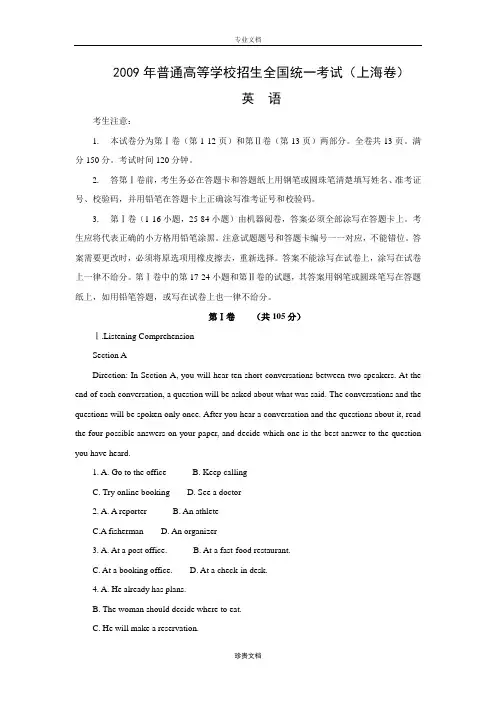
2009年普通高等学校招生全国统一考试(上海卷)英语考生注意:1.本试卷分为第Ⅰ卷(第1-12页)和第Ⅱ卷(第13页)两部分。
全卷共13页。
满分150分。
考试时间120分钟。
2.答第Ⅰ卷前,考生务必在答题卡和答题纸上用钢笔或圆珠笔清楚填写姓名、准考证号、校验码,并用铅笔在答题卡上正确涂写准考证号和校验码。
3.第Ⅰ卷(1-16小题,25-84小题)由机器阅卷,答案必须全部涂写在答题卡上。
考生应将代表正确的小方格用铅笔涂黑。
注意试题题号和答题卡编号一一对应,不能错位。
答案需要更改时,必须将原选项用橡皮擦去,重新选择。
答案不能涂写在试卷上,涂写在试卷上一律不给分。
第Ⅰ卷中的第17-24小题和第Ⅱ卷的试题,其答案用钢笔或圆珠笔写在答题纸上,如用铅笔答题,或写在试卷上也一律不给分。
第Ⅰ卷(共105分)Ⅰ.Listening ComprehensionSection ADirection: In Section A, you will hear ten short conversations between two speakers. At the end of each conversation, a question will be asked about what was said. The conversations and the questions will be spoken only once. After you hear a conversation and the questions about it, read the four possible answers on your paper, and decide which one is the best answer to the question you have heard.1. A. Go to the office B. Keep callingC. Try online bookingD. See a doctor2. A. A reporter B. An athleteC.A fishermanD. An organizer3. A. At a post office. B. At a fast-food restaurant.C. At a booking office.D. At a check-in desk.4. A. He already has plans.B. The woman should decide where to eat.C. He will make a reservation.D. The woman can ask her brother for advice.5. A. He got wet in the rainB. The shower was out of orderC. He d idn’t hear the phone ringingD. He got out of the shower to answer the phone.6. A. Reasonable. B. Bright. C. Serious D. Ridiculous.7. A. Send leaflets. B. Go sightseeing.C. Do some gardening.D. Visit a lawyer.8. A. Her doorbel l doesn’t need repair.B. She didn’t expect him to come so early.9. A. She won’t go to the beach if it rains.B. She would like the man to get to the beach.C. It will clear up tomorrow.D. It was pouring when she was at the beach.10. A. What to take up as a hobby. B. How to keep fit.C. How to handle pressure.D. What to play with.Section BDirections: In Section B, you will hear two short passages, and you will be asked three questions on each of the passages. The passages will be read twice, but the questions will be spoken only once. When you hear a question, read the four possible answers on your paper and decide which one would be the best answer to the question you have heard.Questions 11 through 13 are based on the following passage.11. A. Her school was in a small village.B. She was outstanding at school.C. She was the only Asian girl there.D. Her parents were in London.12. A. London. B. Bath. C. Swindon. D. Oxford.13. A. Coming across a radio producer. B. Taking an earlier train.C. Meeting a professional artist.D. Wearing tow odd shoes.Questions 14 through 16 are based on the following speech.14. A. Education children. B. Saving rare animals.C. Recreating an environment.D. Making a profit.15. A. Animals make visitors stressful.B. Animals must live their lives in cages.C. Animals can feel bored and sad.D. Animals are in danger of extinction.16. A. They are still useful and necessary.B. They have more disadvantages then advantages.C. They are a perfect environment for animals.D. They are recreative places for animals.Section CDirections: In Section C, you will hear two longer conversations. The conversations will be read twice. After you hear each conversation, you are required to fill in the numbered blanks with the information you have heard. Write your answers on your answer sheet.Blanks 17 through 20 are based on the following conversations.Complete the form. Write ONE WORD for each answer.Blanks 21 through 24 are based on the following conversation.Complete the form. Write NO MORE THAN THREE WORDS for each answer.Ⅱ.Grammar and V ocabularySection ADirections: Beneath each of the following sentences there are four choices marked A, B, C and D. Choose the one answer that best completes the sentence.25. Four Chinese models were ______ the 14 people awarded prizes on Friday at the World Supermodel Competition.A. amongB. betweenC. alongD. beside【答案】A【解析】among表示“(三者或三者以上人或事物)之中,之间”;between指“两者之间”;along沿着;beside在旁边。
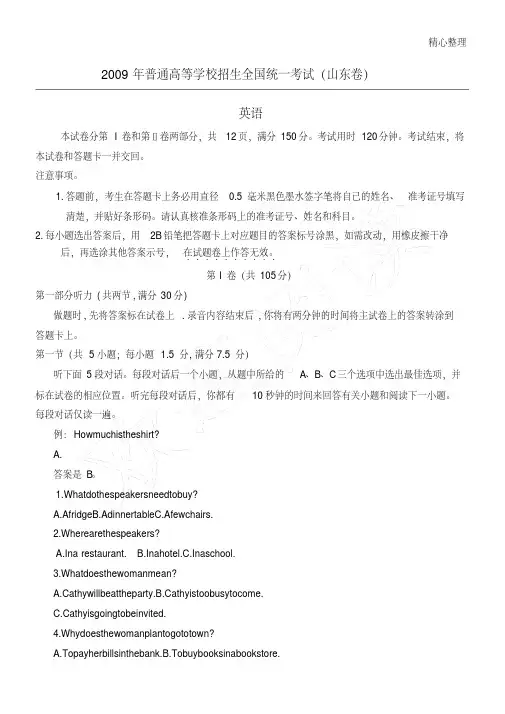
精心整理2009年普通高等学校招生全国统一考试(山东卷)英语本试卷分第I卷和第Ⅱ卷两部分,共12页,满分150分。
考试用时120分钟。
考试结束,将本试卷和答题卡一并交回。
注意事项。
1.答题前,考生在答题卡上务必用直径0.5毫米黑色墨水签字笔将自己的姓名、准考证号填写清楚,并贴好条形码。
请认真核准条形码上的准考证号、姓名和科目。
2.每小题选出答案后,用2B铅笔把答题卡上对应题目的答案标号涂黑,如需改动,用橡皮擦干净后,再选涂其他答案示号,在试题卷上作答无效。
..........第I卷(共105分)第一部分听力(共两节,满分30分)做题时,先将答案标在试卷上.录音内容结束后,你将有两分钟的时间将主试卷上的答案转涂到答题卡上。
第一节(共5小题;每小题 1.5分,满分7.5分)听下面5段对话。
每段对话后一个小题,从题中所给的A、B、C三个选项中选出最佳选项,并标在试卷的相应位置。
听完每段对话后,你都有10秒钟的时间来回答有关小题和阅读下一小题。
每段对话仅读一遍。
例:Howmuchistheshirt?A.答案是B。
1.Whatdothespeakersneedtobuy?A.AfridgeB.AdinnertableC.Afewchairs.2.Wherearethespeakers?A.Ina restaurant.B.Inahotel.C.Inaschool.3.Whatdoesthewomanmean?A.Cathywillbeattheparty.B.Cathyistoobusytocome.C.Cathyisgoingtobeinvited.4.Whydoesthewomanplantogototown?A.Topayherbillsinthebank.B.Tobuybooksinabookstore.。
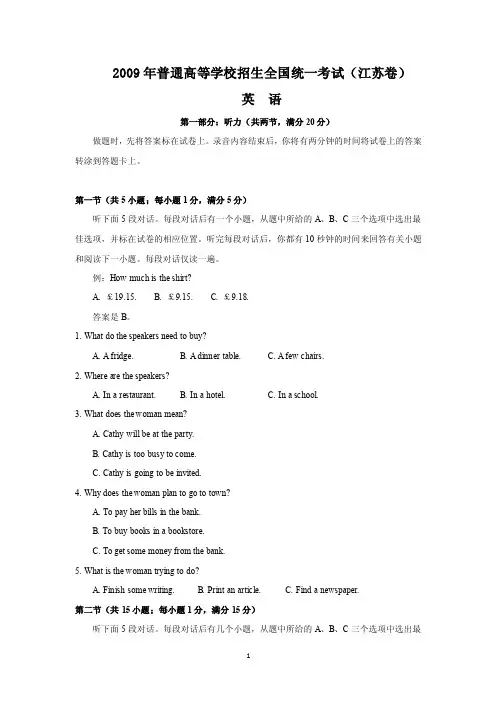
2009年普通高等学校招生全国统一考试(江苏卷)英语第一部分:听力(共两节,满分20分)做题时,先将答案标在试卷上。
录音内容结束后,你将有两分钟的时间将试卷上的答案转涂到答题卡上。
第一节(共5小题;每小题1分,满分5分)听下面5段对话。
每段对话后有一个小题,从题中所给的A、B、C三个选项中选出最佳选项,并标在试卷的相应位置。
听完每段对话后,你都有10秒钟的时间来回答有关小题和阅读下一小题。
每段对话仅读一遍。
例:How much is the shirt?A. £19.15.B. £9.15.C. £9.18.答案是B。
1. What do the speakers need to buy?A. A fridge.B. A dinner table.C. A few chairs.2. Where are the speakers?A. In a restaurant.B. In a hotel.C. In a school.3. What does the woman mean?A. Cathy will be at the party.B. Cathy is too busy to come.C. Cathy is going to be invited.4. Why does the woman plan to go to town?A. To pay her bills in the bank.B. To buy books in a bookstore.C. To get some money from the bank.5. What is the woman trying to do?A. Finish some writing.B. Print an article.C. Find a newspaper.第二节(共15小题;每小题1分,满分15分)听下面5段对话。
每段对话后有几个小题,从题中所给的A、B、C三个选项中选出最佳选项,并标在试卷的相应位置。
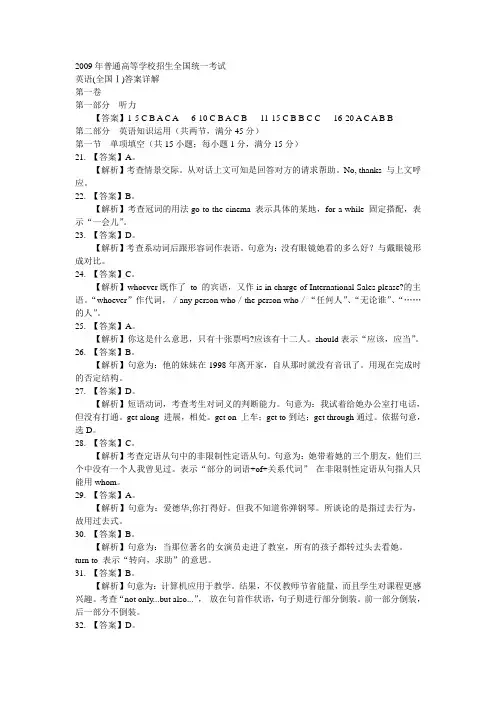
2009年普通高等学校招生全国统一考试英语(全国Ⅰ)答案详解第一卷第一部分听力【答案】1-5 C B A C A 6-10 C B A C B 11-15 C B B C C 16-20 A C A B B第二部分英语知识运用(共两节,满分45分)第一节单项填空(共15小题;每小题1分,满分15分)21. 【答案】A。
【解析】考查情景交际。
从对话上文可知是回答对方的请求帮助。
No, thanks 与上文呼应。
22. 【答案】B。
【解析】考查冠词的用法go to the cinema 表示具体的某地,for a while 固定搭配,表示“一会儿”。
23. 【答案】D。
【解析】考查系动词后跟形容词作表语。
句意为:没有眼镜她看的多么好?与戴眼镜形成对比。
24. 【答案】C。
【解析】whoever既作了to 的宾语,又作is in charge of International Sales please?的主语。
“whoever”作代词,/any person who/the person who/“任何人”、“无论谁”、“……的人”。
25. 【答案】A。
【解析】你这是什么意思,只有十张票吗?应该有十二人。
should表示“应该,应当”。
26. 【答案】B。
【解析】句意为:他的妹妹在1998年离开家,自从那时就没有音讯了。
用现在完成时的否定结构。
27. 【答案】D。
【解析】短语动词,考查考生对词义的判断能力。
句意为:我试着给她办公室打电话,但没有打通。
get along 进展,相处。
get on 上车;get to到达;get through通过。
依据句意,选D。
28. 【答案】C。
【解析】考查定语从句中的非限制性定语从句。
句意为:她带着她的三个朋友,他们三个中没有一个人我曾见过。
表示“部分的词语+of+关系代词”在非限制性定语从句指人只能用whom。
29. 【答案】A。
【解析】句意为:爱德华,你打得好。
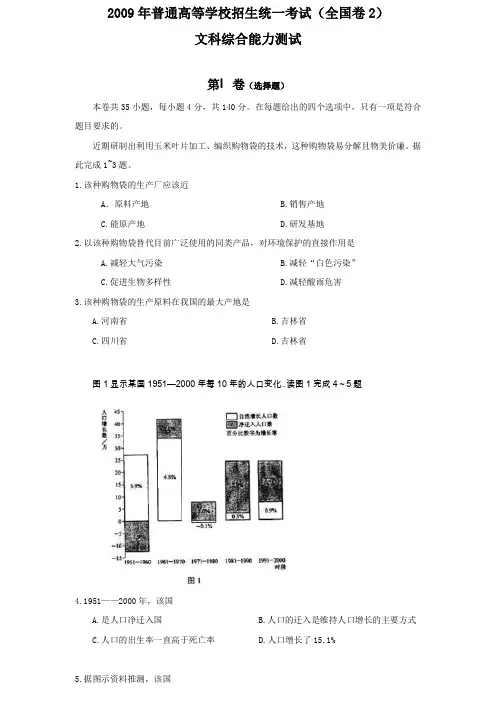
2009年普通高等学校招生统一考试(全国卷2)文科综合能力测试第Ι卷(选择题)本卷共35小题,每小题4分,共140分。
在每题给出的四个选项中,只有一项是符合题目要求的。
近期研制出利用玉米叶片加工、编织购物袋的技术,这种购物袋易分解且物美价廉。
据此完成1~3题。
1.该种购物袋的生产厂应该近A.原料产地 B.销售产地C.能原产地D.研发基地2.以该种购物袋替代目前广泛使用的同类产品,对环境保护的直接作用是A.减轻大气污染B.减轻“白色污染”C.促进生物多样性D.减轻酸雨危害3.该种购物袋的生产原料在我国的最大产地是A.河南省B.吉林省C.四川省D.吉林省图1显示某国1951—2000年每10年的人口变化读图1完成4~5题4.1951——2000年,该国A.是人口净迁入国B.人口的迁入是维持人口增长的主要方式C.人口的出生率一直高于死亡率D.人口增长了15.1%5.据图示资料推测,该国A.自20世纪70年代,人口再生产进入现代型B.可能位于欧洲C.1990年人口达到900万D.20世纪末青壮年人口比重偏大图2中。
H地恰与某高压天气系统中心吻合,该天气系统以每天约200千米的速度东移。
据此完成6~8题。
6.H地与甲聚落的相对高差约为A. 800米B.1500米C. 1800米D.2100米7.上午10时,H地气温为12℃,甲聚落气温为17℃。
到15时甲聚落的气温最接近A.15℃B.18℃C.21℃D.24℃8.甲聚落第二天的天气状况为A.晴天转阴雨B.大风有浮尘C.晴暖有微风D.阵风间暴雨某旅游团希望在杭州西湖欣赏“雷锋(塔)夕照”的同时,也领略“月到中天(月亮高度最大),水面风来”的情境。
(注:月球公转周期约为30天,农历初一月球在天空中的视位置最靠近太阳)完成9~11题。
9.若旅行团在某日16时左右看到了“月到中天”,则该日式农历A.初二B.初五C.初八D.十一10.若该旅行团在某日18时40分左右看到“月到中天”,则该日式农历A.初二B.初五C.初八D.十一11.若该旅行团在18时40分左右看到“月到中天”,并欣赏到“雷峰夕照”,那么这时期A.华北平原小麦丰收在望B.长江三角洲油菜花盛开C.松嫩平原稻谷飘香D.山东半岛瑞雪迎春12. 关于中国姓氏起源,唐人柳芳说:“氏于国,则齐鲁秦吴;氏于谥,则文武成宣……氏于事,则巫乙匠陶。
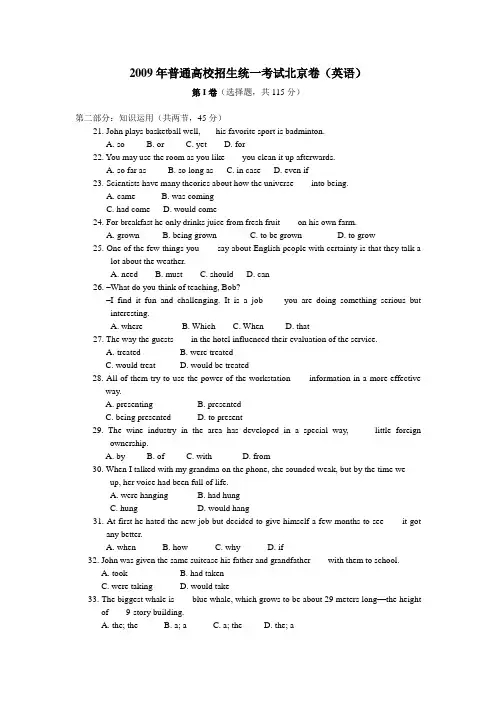
2009年普通高校招生统一考试北京卷(英语)第I卷(选择题,共115分)第二部分:知识运用(共两节,45分)21. John plays basketball well, ___his favorite sport is badminton.A. soB. orC. yetD. for22. Y ou may use the room as you like ___ you clean it up afterwards.A. so far asB. so long asC. in caseD. even if23. Scientists have many theories about how the universe ___ into being.A. cameB. was comingC. had comeD. would come24. For breakfast he only drinks juice from fresh fruit ___ on his own farm.A. grownB. being grownC. to be grownD. to grow25. One of the few things you ___ say about English people with certainty is that they talk alot about the weather.A. needB. mustC. shouldD. can26. –What do you think of teaching, Bob?–I find it fun and challenging. It is a job ___ you are doing something serious butinteresting.A. whereB. WhichC. WhenD. that27. The way the guests ___ in the hotel influenced their evaluation of the service.A. treatedB. were treatedC. would treatD. would be treated28. All of them try to use the power of the workstation ___ information in a more effectiveway.A. presentingB. presentedC. being presentedD. to present29. The wine industry in the area has developed in a special way, ____ little foreignownership.A. byB. ofC. withD. from30. When I talked with my grandma on the phone, she sounded weak, but by the time we ___up, her voice had been full of life.A. were hangingB. had hungC. hungD. would hang31. At first he hated the new job but decided to give himself a few months to see ___ it gotany better.A. whenB. howC. whyD. if32. John was given the same suitcase his father and grandfather ___ with them to school.A. tookB. had takenC. were takingD. would take33. The biggest whale is ___ blue whale, which grows to be about 29 meters long—the heightof ___ 9-story building.A. the; theB. a; aC. a; theD. the; a34. ____ twice, the postman refused to deliver our letters unless we changed our dog.A. Being bittenB. BittenC. Having bittenD. To be bitten35. Being a parent is not always easy, and being the parent of a child with special needs oftencarries with ___ extra stress.A. itB. themC. oneD. him第二节完形填空(共20小题,每小题1.5分,共30分)阅读下面短文,掌握其大意,从每题所给的A、B、C、D四个选项中,选出最佳选项。
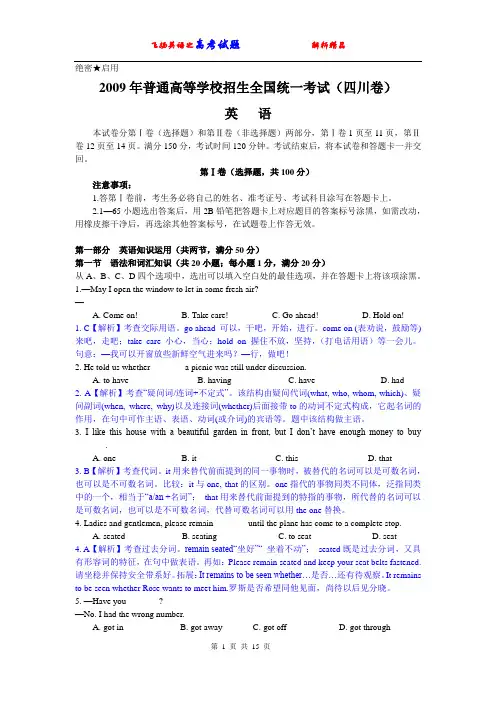
绝密★启用2009年普通高等学校招生全国统一考试(四川卷)英语本试卷分第Ⅰ卷(选择题)和第Ⅱ卷(非选择题)两部分,第Ⅰ卷1页至11页,第Ⅱ卷12页至14页。
满分150分,考试时间120分钟。
考试结束后,将本试卷和答题卡一并交回。
第Ⅰ卷(选择题,共100分)注意事项:1.答第Ⅰ卷前,考生务必将自己的姓名、准考证号、考试科目涂写在答题卡上。
2.1—65小题选出答案后,用2B铅笔把答题卡上对应题目的答案标号涂黑,如需改动,用橡皮擦干净后,再选涂其他答案标号,在试题卷上作答无效。
第一部分英语知识运用(共两节,满分50分)第一节语法和词汇知识(共20小题;每小题1分,满分20分)从A、B、C、D四个选项中,选出可以填入空白处的最佳选项,并在答题卡上将该项涂黑。
1.—May I open the window to let in some fresh air?—_______A. Come on!B. Take care!C. Go ahead!D. Hold on!1. C【解析】考查交际用语。
go ahead 可以,干吧,开始,进行。
come on (表劝说,鼓励等)来吧,走吧;take care 小心,当心;hold on 握住不放,坚持,(打电话用语)等一会儿。
句意:—我可以开窗放些新鲜空气进来吗?—行,做吧!2. He told us whether _______ a picnic was still under discussion.A. to haveB. havingC. haveD. had2. A【解析】考查“疑问词/连词+不定式”。
该结构由疑问代词(what, who, whom, which)、疑问副词(when, where, why)以及连接词(whether)后面接带to的动词不定式构成,它起名词的作用,在句中可作主语、表语、动词(或介词)的宾语等。
题中该结构做主语。
3. I like this house with a beautiful garden in front, but I don’t have enough money to buy _______.A. oneB. itC. thisD. that3. B【解析】考查代词。
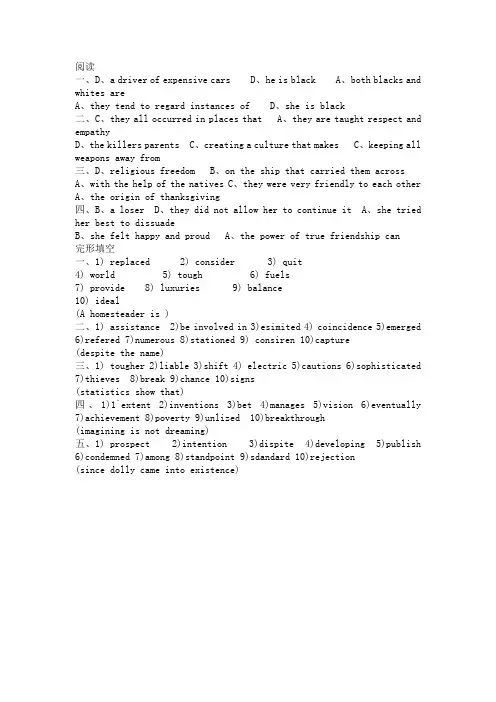
阅读一、D、a driver of expensive cars D、he is black A、both blacks and whites areA、they tend to regard instances of D、she is black二、C、they all occurred in places that A、they are taught respect and empathyD、the killers parents C、creating a culture that makes C、keeping all weapons away from三、D、religious freedom B、on the ship that carried them acrossA、with the help of the natives C、they were very friendly to each otherA、the origin of thanksgiving四、B、a loser D、they did not allow her to continue it A、she tried her best to dissuadeB、she felt happy and proud A、the power of true friendship can完形填空一、1) replaced 2) consider 3) quit4) world 5) tough 6) fuels7) provide 8) luxuries 9) balance10) ideal(A homesteader is )二、1) assistance 2)be involved in 3)esimited 4) coincidence 5)emerged6)refered 7)numerous 8)stationed 9) consiren 10)capture(despite the name)三、1) tougher 2)liable 3)shift 4) electric 5)cautions 6)sophisticated7)thieves 8)break 9)chance 10)signs(statistics show that)四、1)1`extent 2)inventions 3)bet 4)manages 5)vision 6)eventually7)achievement 8)poverty 9)unlized 10)breakthrough(imagining is not dreaming)五、1) prospect 2)intention 3)dispite 4)developing 5)publish6)condemned 7)among 8)standpoint 9)sdandard 10)rejection(since dolly came into existence)As is known to all, waste on campus has become a more and more serious problem. We can easily see many students dump a lot of food in the garbage can. Some students spend thousands of yuan buying fashionable clothes and so on.The negative effects of waste can be shown in the following aspects. In the first place, it makes some students dependent on their parents for money, which is harmful to their development. If they don’t learn to support themselves, they will be “useless people” when they graduate.In the second place, it is not easy for our parents to arrange for our schooling. Last but not the least important, there is no denying the fact that our country is still poor. There are many people who cannot go to university and many poor people still need our help.As far as I am concerned, I should set a good example to reduce waste on campus. First of all, I will refrain from wasting anything, from food to stationery. What’s more, I’m determined to call on more schoolmates to fight against waste.Only through these measures can we hope to reduce waste on campus.。
2009年普通高等学校招生全国统一考试 英 语 【总卷评析】从测试反馈和卷面总体分析的情况来看,体现了语言能力的考查和高考试题体现的选拔性,突出了考试大纲对语言基本功的测试。 第一卷(选择题) 第一部分 英语知识运用(共三节,满分50分) 第一节 语音知识(共5小题;每小题1分,满分5分) 【总体评析】 观察试题单词,可看出均侧重基础和高频词汇的考查。所以,总体而言,语音知识这道大题,难易度的设置较为适中,有选拔的梯度设计。 这套试卷选取了字母两个辅音字母―c, x‖、一个元音字母及一个元音字母组合―i, ei‖和一个半元音字母―y‖来进行基本语音考查。基本上能涵盖完整的元辅音及组合元音字母发音的考查。从辨音难易度来看,第1、2和4小题读音区别度比较明显,考生不易失分。第3小题的迷惑度较大,再次就是第5小题具有一定得迷惑度,但相对第3小题来看,要容易得分。 从A、B、C、D四个选项中,找出其划线部分与所给单词的划线部分读音相同的选项,并在答题卡上将该项涂黑。 例:have A. gave B. save C. hat D. made 答案是C 1. July A. diary B. energy C. reply D. daily 【答案】C 【解析】该选项y读音/ai/,而,其余发/i/。区别度较大,考生一般不易失分。 2. medicine A. twice B. medical C. perfect D. clinic 【答案】A。 【解析】字母―c‖发/s/,而其余排除项发音/k/,比较明显,不含糊,考生基本能判别。 3. seize A. neighbour B. weigh C. eight D. receive 【答案】D。 【解析】seize中的―ei‖读音/i:/。而其余项读音/ei/。 4. determine A. remind B. minister C. smile D. tidy 【答案】B。 【解析】该字母读音/i/,其余排除项读音/ai/。尽管读音的区别度大,容易判断,但是对于minister―大臣, 牧师‖一词,依然会有相当的学生不熟悉。这要引起注意。 5. exist A. experience B. examine C. excite D. explode 【答案】B。 【解析】exist读音[iɡ‘zist]。而其余选项的 ―x‖发音/ks/。
第二节 语法和词汇知识(共15小题;每小题1分,满分15分) 【总体评析】(1)从15道小题的难易度和得失分的情况看,难度适中、考生不易丢分的有:第6、7、11、16、18和19题;而其余有一定难度,考生把握不准。尤其是第10、12小题,考生普遍失分。 (2)这15道小题涵盖的语言点有:固定句型、不定代词、时态、形容词副词、状语引导词、固定短语、冠词、实义动词之间的区别、非谓语动词Ving、非限制性定语从句、交际用语、情态动词。
从A、B、C、D四个选项中,选出可以入空白处的最佳选项,并在答题卡上将该项涂黑。 例:It is generally considered unwise to give a child he or she wants. A. however B. whatever C. whichever D. whenever 答案是B。 6. It is often that human beings are naturally equipped to speak. A. said B. to say C. saying D. being said 【答案】A 【解析】考查的是固定句型(it is +Ved +that从句)。 7. Charles was alone at home, with looking after him. A. someone B. anyone C. not one D. no one 【答案】D 【解析】考查不定代词 8. Progress so far very good and we are sure that the work will be finished on time. A. was B. had been C. has been D. will be 【答案】C 考查了时态--现在完成时 9. The children loved their day trip, and they enjoyed the horse ride . A. most B. more C. less D. little 【答案】A 【解析】考查形容词(immediate)、副词等(most、much too与too much的区别) 10. All the dishes in this menu, otherwise stated, will serve two to three people. A. as B. if C. though D. unless 【答案】D 【解析】考查状语引导词(unless)。全句意思是:在这份菜单上的所有菜,除非另外说明,会给二到三个人食用。 11. I‘m sure that your letter will get attention. They know you‘re waiting for the reply. 【答案】B 【解析】考查形容词(immediate)、副词等(most、much too与too much的区别) A. continued B. immediate C. careful D. general 12. The CDs are on sale! Buy one and you get completely free. A. other B. others C. one D. ones 【答案】C 【解析】考查不定代词 13. Jenny nearly missed the flight doing too much shopping. A. as a result of B. on top of C. in front of D. in need of 【答案】A 【解析】考查固定短语(as a result of―由于。。。的结果‖)。 14. What I need is book that contains ABC of oil painting. A. a; 不填 B. the; 不填 C. the; an D. a ; the 【答案】D 【解析】考查冠词 15. If you leave the club, you will not be back in . A. received B. admitted C. turned D. moved 【答案】B 【解析】考查实义动词之间的区别(receive, admit, turn以及move。) 16. They use computers to keep the traffic smoothly. A. being run B. run C. to run D. running 【答案】D 【解析】考查非谓语动词Ving,这儿构成(keep sth. doing。)。 17. My friend showed me round the town, was very kind of him. A. which B. that C. where D. it 【答案】A 考查非限制性定语从句(这儿的which指代前面整句话内容。) 18. It‘s high time you had your hair cut ; it‘s getting . 【答案】B 【解析】考查形容词(immediate)、副词等(most、much too与too much的区别) A. too much long B. much too long C. long too much D. too long much 19. —— Do you mind my opening the window? It‘s a bit hot in here. —— , as a matter of fact A. Go ahead B. Yes, my pleasure C. Yes, I do D. Come on 【答案】C 【解析】考查交际用语 20. I can‘t leave. She told me that I stay here until she comes back. A. can B. must C. will D. may 【答案】B 【解析】查情态动词must(必须、一定)
第三节 完形填空 (共20小题;每小题1. 5分,满分30分) 【总体评析】最近几年来的完形填空试题材料选材上,都力图选取一篇有教育意义的文章,通常来讲,这样的文章均会是一篇记叙文或者一个与生活有关的一些经历描述。这篇文章就是属于此类。这是一篇励志文章:通过描述自己对父亲喜爱的―try it!‖(尝试) 来影响自己对选择职业、工作目标和生活斗志方面思想的形成。作者描述了一些有趣的事实:在尝试中,自己的本不具有的一些生活技能居然在通过各种经历后养成了。所以连作者本人都发出感叹:―I‘ve also discovered that if I believe in what I‘m doing and work hard at achieving my goal, I will succeed. ‖(我同时也发现,如果我认为我正在做的事情有益并且我为之而努力去实现我的目标的话,我就会取得成功。)这样的励志思想,也正是这篇完形材料在高考中要达到的教育目的。 但是,该试题的难易度和前几年相比较而言,难度有所增加。多数考生不能清楚地理解,这道试题还有一定的难度区分。在一些选项上,会出现大范围的答题失误。比如:24题、25题 (逻辑度不很明朗) 但是对于语言运用能力很强的考生,也能克服这种困难。